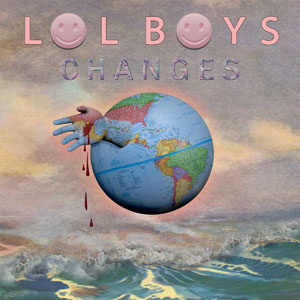LOL Boys Changes EP
The title of the latest EP from Jerome Potter and Marcus Garcia (a.k.a. LOL Boys) […]

The title of the latest EP from Jerome Potter and Marcus Garcia (a.k.a. LOL Boys) offers a fitting one-word description of what to expect from its six tempered tunes. Although the LA- and Montreal-based duo has tackled several styles during its relatively short lifespan, the pair’s musical efforts thus far have often been focused on creating party music, while its public persona has emphasized the producers’ carefree, fun-loving attitudes. Granted, hints of a more fully formed LOL Boys have trickled in recently with “Moments in Heartbreak” and last year’s LOL Boys and LDR EPs, but Changes is perhaps the first truly serious musical statement from a duo that has long flashed a great deal of potential, but whose actual musical output has often been overshadowed by a blog-worthy inception story.
LOL Boys opens Changes with its title track, which sets the table for the rest of the record with a jazzy drum intro that employs heavy use of ride cymbal. As a trumpet lick and electric piano enter the ensemble, it’s clear that Changes is already a dramatic turn from the buzzing party jams for which the duo is largely known. Even after the bassline and a four-on-the-floor kick join in, the song is propelled by its jazzy swing, rather than the inexorable stomp that generally characterizes house music. “Changes,” in fact, can barely be described as house; despite its construction via computers, it’s just as easy to envision the song being played live in a smoke-filled speakeasy as it is to imagine it blasting out of a sound system in a nightclub. “Mind’s Clouded” is a lean, percussion-based tune that, like “Changes,” features processed bits of vocals from female hip-hop duo Heart Streets. It’s simple and pretty, with a shuffling, upbeat drum pattern and a thick bassline. The song’s primary purpose, however, is to serve as an extended introduction to the EP’s emotional high point, the tender and understated “Get Close To Me.”
Chicago chanteuse Angelina Lucero lends her vocal charm to “Get Close To Me,” repeatedly imploring “How can I get you?” over a drum track that starts off crisp and punchy before opening up with a shimmering, swinging ride pattern. LOL Boys shows immense prudence on the track, offering minor digital edits to the longing vocals while deploying short bursts of synth-created flute sounds as the primary accompaniment. A fathomless bassline purrs behind the proceedings, ensuring that a proper subwoofer will deliver a deep rumble in the gut of listeners, in addition to the likely tug at their heartstrings. While “Get Close To Me” is not a likely candidate for peak-time party music, the song’s vibrant climax is certainly capable of drawing an emotional response from ecstatic club-goers, not to mention at-home listeners daydreaming of a distant loved one.
The final LOL Boys composition on Changes is “Don’t Want You,” which also features Angelina Lucero on vocals. Again, the ride cymbal is a persistent element of the track, but on “Don’t Want You,” the spacey textures it creates are reinforced through drifting synthesizer arpeggios and a blanket of warm synth pads. These soothing atmospherics are juxtaposed with a somewhat harsh, recurring vocal build, and a percussion-centric breakdown that takes a short jaunt into half time.
LA-based musician (and recent XLR8R podcast contributor) Anenon is responsible for the record’s next track, a cover of “Changes,” on which he devliers an extended tenor sax solo over a simple drum and piano loop. The rework reinforces the idea of “Changes” as a jazz piece; it feels as if Anenon is simply taking his turn at improvisation after the trumpeter and vocalist had their shot on the original version. On the EP’s final track, Shlohmo takes the song in a different direction, removing the horns and ride pattern to unveil a remix more in line with contemporary bass music. The remixed tune offers low and long synth tones, trap-style drums, and vocals pitched in either direction. Although the song lacks the the fresh inventiveness seen on the bulk of the record, its slo-mo pace and melancholic beauty provide a fitting coda for Changes.
One of the most impressive aspects of Changes is that the EP lacks the artificial, overtly computer-made quality evident in the past work of LOL Boys and other like-minded producers. Considering that collaborating on Changes required long-distance communication via the internet, this is a particularly striking display of the two beatmakers’ prowess as producers and musicians. Rather than culling samples from their influences and assembling them into a mish-mash of dance music, the members of LOL Boys have actually set about creating their own take on pop, jazz, and R&B, one constructed from the ground up. In what could be described as a turnaround for the sometimes overindulgent duo, Changes has no gimmicks or frills. It’s austere and touching, and although there was nothing necessarily broken about LOL Boys’ previous formula, this new EP represents an undeniably positive change.

